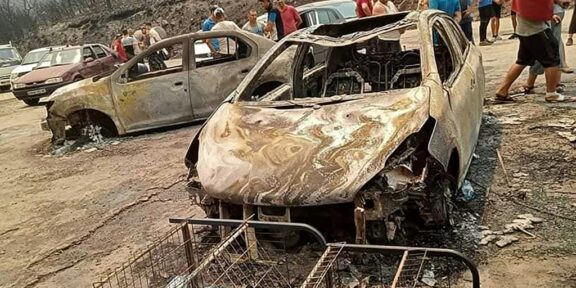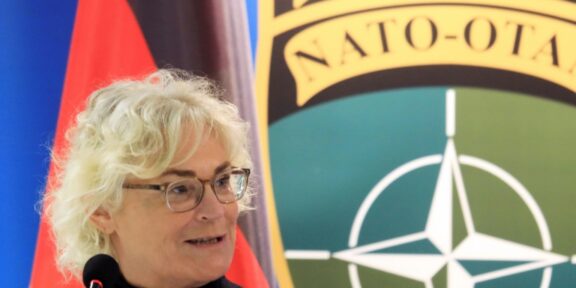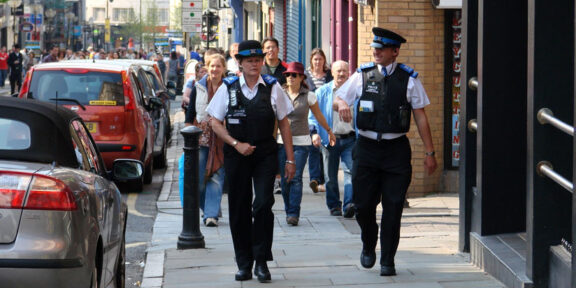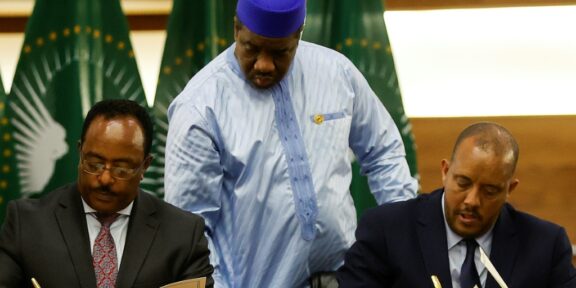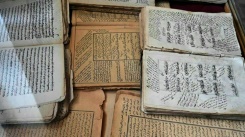Deal struck to open Gaza border for aid




 US President Joe Biden on Wednesday unveiled a deal to allow desperately-needed humanitarian aid to enter war-torn Gaza, where one million people have fled their homes amid withering Israeli air strikes.After face-to-face talks in Israel and intense telephone diplomacy with Egypt, Biden said a limited number of trucks would be allowed to cross the shuttered Rafah crossing from Egypt into Gaza from Friday. It would be the first international relief to enter Gaza since October 7, when Palestinian militant group Hamas launched shock raids into Israel, killing 1,400 people, mostly civilians, and seizing about 200 hostages.Since then, Israel has besieged the Palestinian enclave, launching wave after wave of air strikes, enforcing a blockade and deploying tens of thousands of troops to the border in preparation for an expected ground assault. The United Nations and humanitarian groups have begged for the military stranglehold on Gaza to be eased, to allow supplies of water, food, fuel and medicines to enter. Top UN humanitarian official Martin Griffiths on Wednesday said the situation in Gaza was dire, with hospitals overwhelmed, more than 3,000 Gazans killed and 12,500 injured."The pace of death, of suffering, of destruction" he said "cannot be exaggerated."Despite the devastation, more than 100 trucks have been queued for days on the Egyptian side of the border waiting to enter Gaza.Israel fears that aid deliveries could be used as cover to bring in weapons, or could be diverted into the hands of Hamas — which governs the enclave.Israel has already hit the border crossing with multiple air strikes since this phase of the decades-old conflict began.Egypt controls the border and fears throwing open the gates would bring tens of thousands of refugees to its territory.After what he described "blunt" negotiations and a telephone call with Egyptian President Abdel Fattah al-Sisi, Biden indicated that about 20 trucks would enter Gaza to start with, with more to come if all sides agree."We want to get as many of the trucks out as possible," Biden said aboard Air Force One."If Hamas confiscates it or doesn't let it get through… then it's going to end, because we're not going to be sending any humanitarian aid to Hamas," Biden said.Israeli officials said the deliveries would be limited to "food, water and medicine", and that the effort was conditional on aid not being used by Hamas. The UN's Griffiths estimated that about 100 trucks per day were needed to meet the needs in Gaza. – Fog of war -Biden had made a visit to Israel Wednesday, expressing solidarity following the Hamas attacks, trying to gauge Israel's war objectives and hoping to prevent a spillover into regional conflict.He warned Israel to be cautious as it tries to remove the threat from Hamas. "After 9/11, we were enraged in the United States. While we sought justice we also made mistakes," he said.After decades in which Israel has gradually improved ties with its neighbours, the Hamas attacks and Israel's furious response have rekindled old tensions.Anger spiked on Wednesday, with protesters pouring onto the streets in cities from Tripoli to Tehran after a strike on Gaza's Ahli Arab hospital. The Hamas-run health ministry in Gaza claimed 471 people had died as a result, while blaming an Israeli air strike. Israel denied responsibility, saying an initial investigation showed the strike was caused by a malfunctioning rocket fired by Palestinian militant group Islamic Jihad.Like Hamas, Islamic Jihad is proscribed as a terrorist group by the United States and other Western governments.Neither the toll nor the provenance of the strike could be immediately or independently verified.One European intelligence agency told AFP: "There wasn't 200 or even 500 deaths, more likely between 10 and 50."Biden said the Pentagon also believed the strike was caused by an errant Palestinian rocket."Our Defense Department says it's highly unlikely that it was the Israelis. It would have had a different footprint," he said, acknowledging that many around the region would still be sceptical. "I can understand why, in this circumstance, they wouldn't believe. I can understand that," he said, insisting: "I don't say things like that unless I have faith in the source."Eyewitness Adnan al-Naqa said that as he entered the hospital, he heard an "explosion" and "saw a massive fire." "The entire square was on fire. There were bodies everywhere, children, women and elderly people."In the hours following the incident, AFP reporters saw scores of bodies cloaked in bloodstained sheets and white plastic lined the floors at the nearby the Al-Shifa hospital, where victims were said to have been taken.At the Ahli Arab hospital the day after the blast the charred husks of several vehicles littered the blackened courtyard.The Israeli military pointed to the fire damage and the absence of a large impact crater as evidence that it was a rocket misfiring."When a bomb, a big bomb like the ones we use hits the ground, it creates a very big crater," Israel Defense Forces spokesman Jonathan Conricus.Hamas has dismissed Israel's claim of a misfiring rocket, saying its "outrageous lies do not deceive anyone."It also slammed the United States, accusing it of being complicit in the ongoing strikes on Gaza.burs-arb/ser
US President Joe Biden on Wednesday unveiled a deal to allow desperately-needed humanitarian aid to enter war-torn Gaza, where one million people have fled their homes amid withering Israeli air strikes.After face-to-face talks in Israel and intense telephone diplomacy with Egypt, Biden said a limited number of trucks would be allowed to cross the shuttered Rafah crossing from Egypt into Gaza from Friday. It would be the first international relief to enter Gaza since October 7, when Palestinian militant group Hamas launched shock raids into Israel, killing 1,400 people, mostly civilians, and seizing about 200 hostages.Since then, Israel has besieged the Palestinian enclave, launching wave after wave of air strikes, enforcing a blockade and deploying tens of thousands of troops to the border in preparation for an expected ground assault. The United Nations and humanitarian groups have begged for the military stranglehold on Gaza to be eased, to allow supplies of water, food, fuel and medicines to enter. Top UN humanitarian official Martin Griffiths on Wednesday said the situation in Gaza was dire, with hospitals overwhelmed, more than 3,000 Gazans killed and 12,500 injured."The pace of death, of suffering, of destruction" he said "cannot be exaggerated."Despite the devastation, more than 100 trucks have been queued for days on the Egyptian side of the border waiting to enter Gaza.Israel fears that aid deliveries could be used as cover to bring in weapons, or could be diverted into the hands of Hamas — which governs the enclave.Israel has already hit the border crossing with multiple air strikes since this phase of the decades-old conflict began.Egypt controls the border and fears throwing open the gates would bring tens of thousands of refugees to its territory.After what he described "blunt" negotiations and a telephone call with Egyptian President Abdel Fattah al-Sisi, Biden indicated that about 20 trucks would enter Gaza to start with, with more to come if all sides agree."We want to get as many of the trucks out as possible," Biden said aboard Air Force One."If Hamas confiscates it or doesn't let it get through… then it's going to end, because we're not going to be sending any humanitarian aid to Hamas," Biden said.Israeli officials said the deliveries would be limited to "food, water and medicine", and that the effort was conditional on aid not being used by Hamas. The UN's Griffiths estimated that about 100 trucks per day were needed to meet the needs in Gaza. – Fog of war -Biden had made a visit to Israel Wednesday, expressing solidarity following the Hamas attacks, trying to gauge Israel's war objectives and hoping to prevent a spillover into regional conflict.He warned Israel to be cautious as it tries to remove the threat from Hamas. "After 9/11, we were enraged in the United States. While we sought justice we also made mistakes," he said.After decades in which Israel has gradually improved ties with its neighbours, the Hamas attacks and Israel's furious response have rekindled old tensions.Anger spiked on Wednesday, with protesters pouring onto the streets in cities from Tripoli to Tehran after a strike on Gaza's Ahli Arab hospital. The Hamas-run health ministry in Gaza claimed 471 people had died as a result, while blaming an Israeli air strike. Israel denied responsibility, saying an initial investigation showed the strike was caused by a malfunctioning rocket fired by Palestinian militant group Islamic Jihad.Like Hamas, Islamic Jihad is proscribed as a terrorist group by the United States and other Western governments.Neither the toll nor the provenance of the strike could be immediately or independently verified.One European intelligence agency told AFP: "There wasn't 200 or even 500 deaths, more likely between 10 and 50."Biden said the Pentagon also believed the strike was caused by an errant Palestinian rocket."Our Defense Department says it's highly unlikely that it was the Israelis. It would have had a different footprint," he said, acknowledging that many around the region would still be sceptical. "I can understand why, in this circumstance, they wouldn't believe. I can understand that," he said, insisting: "I don't say things like that unless I have faith in the source."Eyewitness Adnan al-Naqa said that as he entered the hospital, he heard an "explosion" and "saw a massive fire." "The entire square was on fire. There were bodies everywhere, children, women and elderly people."In the hours following the incident, AFP reporters saw scores of bodies cloaked in bloodstained sheets and white plastic lined the floors at the nearby the Al-Shifa hospital, where victims were said to have been taken.At the Ahli Arab hospital the day after the blast the charred husks of several vehicles littered the blackened courtyard.The Israeli military pointed to the fire damage and the absence of a large impact crater as evidence that it was a rocket misfiring."When a bomb, a big bomb like the ones we use hits the ground, it creates a very big crater," Israel Defense Forces spokesman Jonathan Conricus.Hamas has dismissed Israel's claim of a misfiring rocket, saying its "outrageous lies do not deceive anyone."It also slammed the United States, accusing it of being complicit in the ongoing strikes on Gaza.burs-arb/ser
Breaking News
-
Robert F. Kennedy Jr., a longtime conspiracy theorist and opponent of vaccines, now has the…
-
At least 130 homes have been destroyed by a wildfire raging outside Los Angeles, as…
-
Record-breaking heat, extreme weather events, air pollution and the spread of infectious disease: climate change…
-
Germany marks 35 years since the Berlin Wall fell with festivities from Saturday under the…
-
EU leaders on Friday pledged to overhaul the bloc's economy with radical changes recommended in…
-
German Chancellor Olaf Scholz, mired in crisis after his three-party coalition collapsed this week, said…
-
US prosecutors announced charges on Friday in an alleged Iranian plot to assassinate former president…
-
Mozambique's opposition on Friday promised fresh protests, as rights groups said at least 30 people…
-
Beyonce and her groundbreaking "Cowboy Carter" album earned a leading 11 nominations for the Grammy…
-
A soldier was killed and another seriously injured in a motorcycle bomb attack attributed to…

